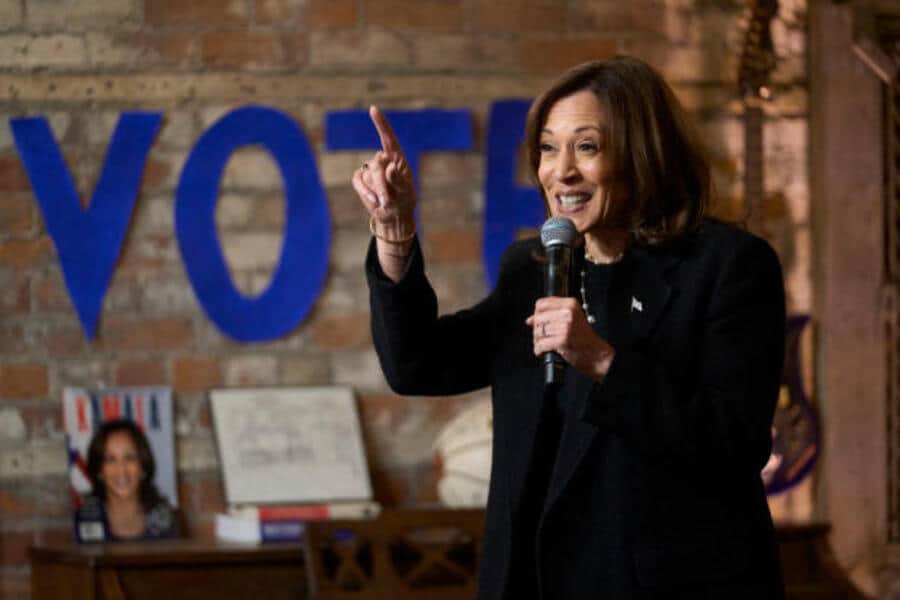Vice President Kamala Harris’ campaign strategy is banking on a strong showing in key battleground states like Michigan and Pennsylvania, with a focus on capturing the suburban vote that has been drifting away from the Republican Party in recent years. Harris’ team is targeting voters who once reliably supported Republicans but have shifted to Democrats due to concerns over issues such as abortion rights, economic policies, and Donald Trump’s perceived weaknesses.
In Michigan, the Harris campaign believes its path to victory runs through suburban areas around Detroit and Grand Rapids. Historically, these regions leaned Republican, but recent shifts have shown growing support for Democrats, partly due to a backlash against the Supreme Court’s decision to overturn Roe v. Wade. The Harris team has emphasized that Trump’s stance on abortion and his broader political behavior have alienated many suburban voters, particularly women and White, college-educated individuals.
According to Chris Wyant, a senior Harris adviser in Michigan, suburban voters are moving away from Trump, and that presents a significant opportunity for the campaign. “What’s emerged as such an opportunity is the suburban voters that we’ve seen, who are very reliable regular voters, who have run away from Donald Trump in the last four years,” said Wyant. Recent polls appear to back up this claim, with a September New York Times/Siena poll showing Harris leading Trump by five points among suburban voters in Michigan.
Similarly, in Pennsylvania, the campaign has been concentrating its efforts on gaining ground in the suburbs. With a new internal memo dubbing these areas “our own mini ‘blue wall’,” the Harris team is confident that the growth in support from suburban voters can flip counties that were narrowly won by Trump in 2020. The campaign’s push in Pennsylvania has included rallies in traditionally red counties, as well as suburban areas around Philadelphia and Pittsburgh. Polls have indicated a tight race in the state, but Harris has seen encouraging numbers, especially among women and White, college-educated voters.
Both states also see Harris and her running mate, Minnesota Governor Tim Walz, making a concentrated effort to reach key demographic groups beyond the suburbs. In Michigan, the campaign is working hard to maintain and boost turnout among Black voters in cities like Detroit and Flint, who are vital to the Democratic base. Wyant highlighted recent initiatives focused on Black men, aiming to replicate or exceed 2020 turnout levels. The campaign’s ground game is visible, with over 50 offices across Michigan, many located in predominantly Black areas to drive engagement.
The campaign has also sought to build bridges with Michigan’s Arab-American and Muslim communities, particularly those in Detroit’s suburbs after concerns arose over the administration’s handling of Middle East conflicts. Harris has met with leaders from these communities, and her team has strategically deployed prominent Muslim figures, such as former Congressman Keith Ellison, to emphasize her commitment to addressing their issues.
Meanwhile, in Pennsylvania, Harris is targeting areas that saw a decline in Democratic voter turnout in 2020. A large focus has been on reconnecting with Black voters in Philadelphia, who are crucial for the campaign’s success. Despite recent efforts, the Trump campaign has tried to paint Harris’ ground game as weak, especially in urban areas. Former President Barack Obama has been brought in to energize Black voters, specifically speaking to Black men, urging them to back Harris and warning against Trump’s divisive rhetoric. “There’s nothing in Donald Trump’s background, career, anything that should lead any citizen, let alone Black men, to vote for him,” said State Sen. Vincent Hughes, echoing Obama’s sentiments.
The Trump campaign is not taking this battle lightly. In both Michigan and Pennsylvania, Trump is focusing on economic concerns, particularly inflation and the transition to electric vehicles. Trump has sought to appeal to blue-collar workers by criticizing Biden and Harris’ green energy policies, suggesting they threaten traditional auto jobs. At rallies, he has repeatedly warned voters that the push for electric cars will lead to job losses, a message aimed at winning over disenchanted union members. “If I don’t win, you will have no auto industry within two to three years,” Trump declared at a recent rally in Flint, Michigan.
In Pennsylvania, Trump is doubling down on his base, focusing on “low-propensity” voters in rural areas who may not consistently turn out for elections. The campaign has also been buoyed by a significant boost from Elon Musk, whose America PAC has invested heavily in Pennsylvania to ensure Trump’s supporters turn out in November. However, the Harris team remains confident, boasting a robust door-to-door campaign that has knocked on over a million doors across the state, including significant inroads into red counties.

